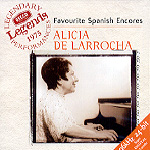Oh where, oh where has that Surinach gone? Oh where, oh where can it be? Here we have one-and-a-half Alicia de Larrocha albums: the whole of her 1975 “Favorite Spanish Encores” recital, filled out with Xavier Montsalvage’s gorgeous, mercurial Concierto Breve. Good as it is to have this overlooked piece (and mesmerizing performance, to boot!) restored to the catalog, what will become of its one-time LP-mate, Carlos Surinach’s Piano Concerto? That was a peppery, exciting piece in its own right, and I urge Decca to reissue it soon. Montsalvage’s musical language might be described as Darius Milhaud’s bitonality without the density and clutter. The Concierto’s lively and lilting third movement begins with a big cadenza, whose spiky harmonies recall Duke Ellington’s burgundy-tinted chord changes; and one melodic fragment even suggests the verse to Frank Loesser’s “Luck Be A Lady”. In the slow movement, the English horn spins out a dark, plaintive theme that is guaranteed to linger in your memory long after the music stops. The spacious sonics capture the robust splendor of Frühbeck de Burgos’ super-alert Royal Philharmonic, as well as the depth of the pianist’s chiaroscuro sonority. Indeed, her bass notes seem to resonate from your loudspeakers to kingdom come.
Performance-wise, each of the 13 solo items represents a soulful jewel in a perfect tiara. Listen, for instance, to Larrocha’s impeccable left-hand repeated notes and tangy melodic stresses in the Mateo Albéniz sonata, or to the zesty ornaments and ebullient rhythms in the two Soler sonatas. She is completely at home with Turina’s more modern, cosmopolitan idiom, and rules the charming Issac Albéniz and Granados miniatures with iron fingers in mink gloves.
I’m especially struck by Larrocha’s treatment of Albéniz’s oft-played Tango, a work nearly as hackneyed as Liszt’s Third Liebestraum, Paderewski’s Minuet in G, or Beethoven’s Für Elise. Most pianists approach this piece by uniformly stressing the first beat of each measure, and letting the basic tango rhythm run on automatic pilot. Larrocha, in contrast, creates a genuine conversation between her precisely voiced left-hand accompanying figures and eloquently phrased right-hand lines. She heightens the melody’s points of tension and release with the subtlest rubato imaginable. By the time it’s over, I’m hooked, and feel compelled to play the track over again so that I might possibly catch details I missed the first time around. Celebrate this special pianist, and buy this disc. Then celebrate yourself for your good taste. [5/25/2001]
































